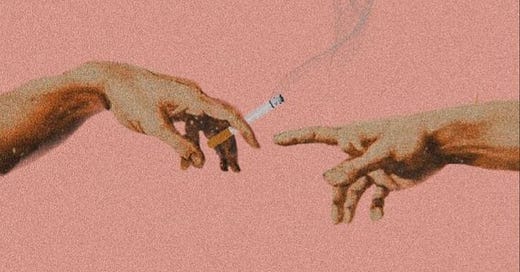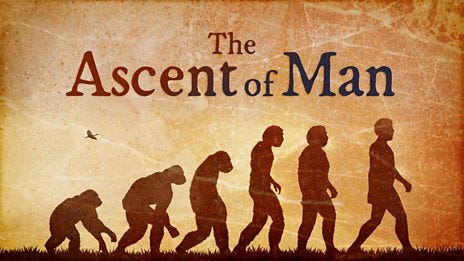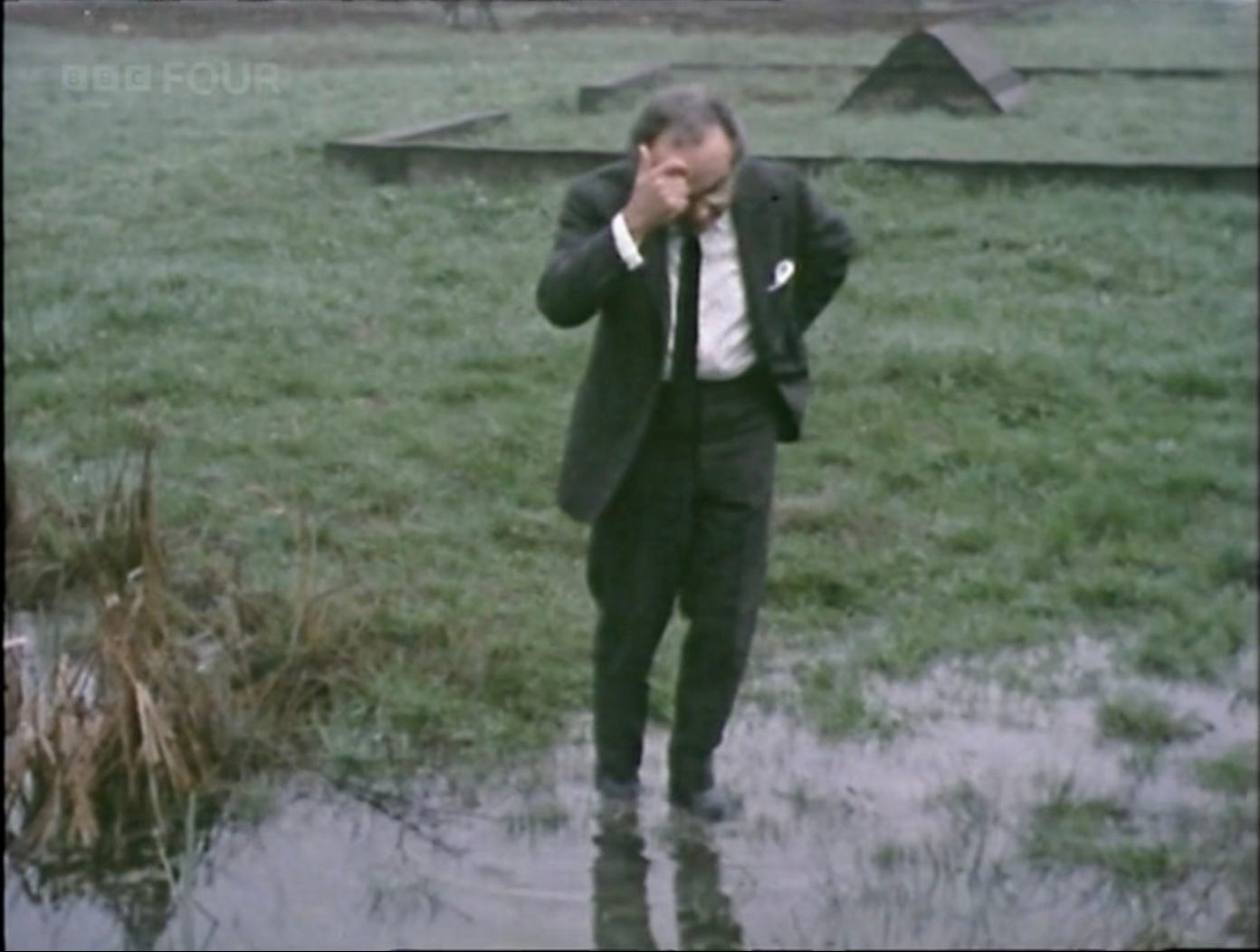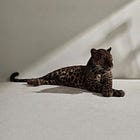why main character energy actually matters
revisiting "The Ascent of Man" in an era when most of us choose to live as NPCs
I've been thinking about birthdays lately. Not in the cake-and-candles way, but in that mid-thirties existential spiral way where you catch yourself staring into bathroom mirrors at 2 AM, wondering if you've changed at all in the past decade, or just accumulated more expensive skincare products and other crap you don’t need.
This week, as birthday number thirty-six creeps closer, I found myself pulling Jacob Bronowski's The Ascent of Man from my bookshelf—cover slightly torn at the edges, a coffee ring on page 47. I hadn't touched it in years. But something about milestone birthdays makes you reach for the big questions. The what-am-I-doing-with-my-life questions. The am-I-becoming-who-I-want-to-be questions.
And Bronowski asks the biggest questions of all.
For those who haven't encountered it (please remedy this immediately), The Ascent of Man was this groundbreaking 1973 BBC series where Bronowski—Polish-British mathematician, poet, philosopher with that rare gift of making complex ideas feel like intimate conversations—takes viewers through the evolution of human knowledge and creativity. But it wasn't just about scientific advancement. What makes Bronowski's work still feel so alive fifty years later is how he connects technical achievement with our humanity, our art, our moral struggles. In a world still recovering from the horrors of World War II, he dared to believe in human progress while acknowledging our capacity for terrible error. It's a love letter to human potential wrapped in a documentary.
The companion book to the series wasn't just a transcript of the TV episodes—which I realized as I sat cross-legged on my bed last night, flipping through its pages, feeling the satisfying weight of it in my hands. There's something about the physicality of books. Holding them, turning the pages, even the smell they develop after they’ve collected enough dust. The way they ask something of you that Netflix never does.
As I turned the pages, I remembered why Bronowski's words had stayed with me. The book offered something the television series couldn't—the chance to pause, to double back, to hold a thought until it unfolds fully. "The reader can ponder, he can linger, he can question, and he can enjoy," Bronowski wrote, acknowledging the different relationship we form with ideas when we encounter them on the page versus the screen. I found myself doing exactly that—lingering on a paragraph about human imagination for twenty minutes, then flipping back to reread something I'd highlighted years ago with a different mind, a different set of questions.
That reflection seems almost prescient now, in our era of endless scrolling and algorithmic feeds that rarely give us time to truly think. When was the last time you let an idea sit with you for longer than the time it takes to double-tap or retweet? When was the last time you returned to the same thought, the same text, again and again, letting it reveal new dimensions with each visit?
Bronowski was that rare intellectual who could solve complex mathematical problems by day and write poetry by night, who saw no contradiction between scientific rigor and emotional depth. "We are all afraid," Bronowski wrote in that gentle, incisive way of his, "for our confidence, for the future, for the world. That is the nature of the human imagination." And yet, paradoxically, it's this same imagination that allows us to envision alternatives, to dream beyond the confines of what is and reach toward what could be.
And I've been wondering lately: What happened to our beautiful restlessness? That uniquely human capacity for intentional change. Not just the passive adaptation that all creatures undergo, but our ability to reimagine ourselves, our societies, our very relationship with the world around us. It's both our glory and our burden, isn't it? To know that we need not remain as we are, that transformation is always possible, is to carry the weight of perpetual responsibility.
The Beautiful Restlessness
There's something almost unbearably poignant about Bronowski's vision of humanity. We are, he suggested, defined not by what we are but by what we might become. Unlike other creatures who simply exist within landscapes and environments, we shape them, driven by a beautiful restlessness that refuses to accept the world as given.
I wonder sometimes if this restlessness lives equally in all of us. I look around at peers who have settled so comfortably into routines, friends who recoil from new ideas as if from physical threat, strangers who move through carefully prescribed patterns with a kind of automated precision. Are they experiencing the same internal imperative toward change that keeps me awake at night, scribbling possibilities in margins? Or have they somehow silenced it?
I’m sure that sounds terribly judgmental, doesn't it? As if my own resistance doesn't manifest in a thousand small surrenders every day.
But there's something to this observation, I think—this sense that some humans seem to live more as what we might call "NPCs" in the narrative of existence. They inhabit rather than create their environments, react rather than initiate, accept rather than question. They move through life following scripts they didn't write and never thought to edit.
Bronowski's work offers a framework for understanding this phenomenon not as a judgment but as a tragedy—the tragedy of unfulfilled human potential.
The Paradox at Our Core
What draws me most deeply to Bronowski's perspective is his recognition of the fundamental paradox at the heart of human existence. We are simultaneously natural beings, governed by biological imperatives, and transcendent creatures capable of abstract thought and self-directed evolution. We are both figures within the landscape and shapers of it.
I feel this contradiction viscerally when I catch myself sleepwalking through days, automatically responding to emails, mindlessly scrolling, engaging in conversations without really being present. In these moments, I am merely a sophisticated animal, responding to stimuli, following well-worn neural pathways. And then something—a line of poetry, a child's unexpected question, the particular quality of light through leaves—awakens me to my distinctly human capacity for awareness and intention.
This awakening is often uncomfortable. It's so much easier to drift, right? To allow ourselves to be carried along by habit and expectation. Change requires effort, risk, the possibility of failure. No wonder we resist it, even as we yearn for it.
"The essence of science," Bronowski wrote, "is that it is always willing to abandon a given idea for a better one; the essence of theology is that it holds its truths to be eternal and immutable." I've come to believe that this willingness to abandon, to let go, to unbecome in service of becoming, is not just the essence of science but of fully realized humanity.
What fascinates me most about our capacity for change is how it manifests across different dimensions of experience. It's one thing to discuss this ability in abstract terms; it's another to trace its contours through the landscapes of our lived reality.
The Technology We Embody
I'm writing these words on a device that would have seemed magical to Bronowski, despite his visionary understanding of human potential. My fingers tap keys that translate thought into text, which will be transmitted across vast distances to reach eyes I may never see. This technological extension of human capability represents perhaps the most visible manifestation of our capacity for change.
But there's something about our relationship with technology that troubles me. Too often, I watch people (myself included) become passive consumers rather than active creators—allowing algorithms to determine what we see, what we know, even what we desire. We build these extensions of ourselves only to surrender our agency to them. Is there anything more tragically ironic than using our uniquely human capacity for change to create systems that ultimately diminish that very capacity?
I think about this when I catch myself reaching automatically for my phone in moments of discomfort or boredom. The device that could connect me to all human knowledge becomes instead an escape from the disquiet that might otherwise spur growth. Technology, like all human creations, is neutral; what matters is whether we use it intentionally, as an expression of our humanity, or allow it to use us.
The Social Fabric We Weave
Another domain where our capacity for change manifests—or doesn't—is in our social structures. Unlike other social animals, whose patterns of interaction are largely determined by instinct, humans can consciously design and redesign the terms of their collective existence.
I've sat through meetings where this capacity is theoretically alive but practically dormant—where executives defend systems they know are broken purely out of fear of the transitional discomfort. I’ve watched a CEO reject proposals that would have improved operations tenfold, simply because he "didn't want to deal with the learning curve." The same man who talks about innovation in quarterly calls refuses to innovate when it might temporarily disrupt his comfort.
This resistance to change is particularly ironic in capitalist environments, which should theoretically thrive on innovation and creative destruction. I'm a firm believer in capitalism's potential to drive human flourishing—it's the most powerful system we've created for unlocking human potential and creating prosperity. But I've seen firsthand how individuals within that system can calcify, becoming so attached to existing patterns that they undermine the very dynamism that makes markets work. The entrepreneur in theory embraces change; the executive in practice often fears it. I've worked with brilliant leaders who built disruptive companies only to later resist the very disruption that made them successful.
"The most powerful drive in the ascent of man is his pleasure in his own skill," Bronowski observed. "He loves to do what he does well, and having done it well, he loves to do it better." I think about this when I watch people defend dysfunctional processes because changing them would require learning new skills, developing new competencies. The fear of temporary incompetence blocks the path to greater mastery.
The Inner Wilderness
Perhaps the most profound domain of human change occurs within what I think of as our inner wilderness—that complex terrain of thoughts, emotions, beliefs, and habits that constitutes our subjective experience.
This is where I struggle most with my own capacity for intentional transformation. I can envision the person I wish to become with vivid clarity, yet find myself enacting the same patterns I've promised to abandon. I understand intellectually that neural pathways can be rewired, that personalities are not fixed, that consciousness itself is malleable—and still, change comes slowly, painfully, if at all.
The frustration of this gap—between what we know is possible and what we manage to achieve—is something Bronowski seemed to understand deeply. His entire body of work is, in some ways, a testament to humanity's struggle to close this gap, to align our actions with our highest aspirations.
In my professional life, I've developed systems for rapid decision-making, for efficient execution, for measured growth. But when it comes to my inner landscape, these same skills often fail me. I find myself defaulting to familiar thought patterns even as I recognize their limitations. It's as if part of me prefers the comfort of known territory, even when that territory no longer serves my growth.
And yet, this inner domain is also where I've witnessed the most remarkable transformations. Friends who have completely reimagined their relationship with desire or fear. Colleagues who have transformed limiting beliefs into sources of creativity. My own slow, halting progress toward greater presence, compassion, integrity.
What would it mean to bring the same innovative spirit that drives capitalism—the willingness to disrupt, to destroy in order to create—to our inner lives? What if we approached our thoughts, our emotional patterns, our identities with the same entrepreneurial mindset that has transformed industries? Not to commodify our inner experience, but to liberate it from stagnation, to allow it the same dynamism we value in markets?
What Bronowski understood, I think, is that this capacity for psychological self-transformation distinguishes us most definitively from other creatures. A tree cannot decide to value its leaves differently; a wolf cannot reconsider its relationship with the moon. But humans can examine their own consciousness and choose to reshape it. We can develop a taste for the person we're becoming.
The Cost of Change and the Price of Stasis
There's a cost to change, of course. Energy, uncertainty, the grief of leaving behind former selves and familiar landscapes. I feel this cost when I force myself to speak up in situations where silence would be more comfortable, when I question beliefs that have long provided security, when I choose the disorientation of growth over the comfort of stagnation.
"The world can only be grasped by action, not by contemplation," Bronowski insisted. "The hand is more important than the eye." I read these words and feel both inspired and indicted. How often do I retreat into contemplation without the courage to act on my insights?
But the price of stasis is higher still. To possess the capacity for intentional change and leave it unexercised is to accept a kind of living death—to become, in essence, less human than we might be. I think this is what troubles me most about the "NPC" phenomenon. It's not that some people choose different values or priorities than mine; it's the suspicion that they're not choosing at all, that they've surrendered the distinctly human privilege of authoring their own existence.
Bronowski's most haunting moment in The Ascent of Man comes when he visits Auschwitz, where many of his family perished. Standing in a pond where victims' ashes were dumped, he takes a handful of mud and lets it slip through his fingers, reflecting on the dangers of certainty:
"When people believe that they have absolute knowledge, with no test in reality, this is how they behave. This is what men do when they aspire to the knowledge of gods... We have to cure ourselves of the itch for absolute knowledge and power."
I return to these words often when I feel myself hardening into certainty about anything—my political views, my assessment of others, my understanding of how the world works. The capacity for change requires perpetual openness, a willingness to be wrong, to learn, to begin again.
This reminds me of my recent piece, “taste is the new intelligence." In a world drowning in content, where AI can generate anything, discernment becomes our most valuable skill. But here's the thing I've been wrestling with—taste isn't just curation. It isn't just filtering. It's something deeper, something I tried to capture in my follow-up piece when I wrote "taste is a way of remembering yourself."
There's a throughline between Bronowski's vision of humanity and this idea of taste as self-remembrance. Both speak to something essential about being human: our capacity to step back from automated responses, to question the given, to remember what moves us beneath the noise of expectation. Both recognize that what makes us human isn't accumulation—of knowledge, of content, of certainty—but discernment, vulnerability, openness to change.
This, perhaps, is the ultimate paradox of human existence: our greatest strength lies not in what we know but in our willingness to question it; not in our achievements but in our readiness to abandon them for better possibilities; not in our identities but in our capacity to transform them.
To be fully human, in Bronowski's vision, is to exist in a state of perpetual becoming. It is to recognize that we are never finished, that completion would be a kind of death. The burden of humanity is precisely this unending responsibility to choose, to create, to change—to develop what I now understand as a kind of taste for our own evolution.
I wonder sometimes what Bronowski would make of our current moment, with its polarized certainties and algorithmic reinforcement of existing beliefs. Would he see it as a failure of our distinctly human capacity for openness and self-questioning? Or would he find hope in the pockets of genuine curiosity and transformation that persist despite these forces?
I think he would recognize what I've been trying to articulate in my writing about taste—that beneath the noise of optimization and content abundance, there's something essential we're in danger of forgetting. Not just what to pay attention to, but how to pay attention. Not just what to choose, but how to remember what moves us.
In my recent pieces, I've been circling around this idea that taste isn't merely curation—it's remembrance. It's "the connective tissue between the child who collected odd little objects for no reason and the adult who still feels something sharp and alive when you find the thing you weren't supposed to love—but do."
There's something about this that connects deeply to Bronowski's vision. When he speaks of human ascent, he's not just talking about technological progress, but about our capacity to remain open to new possibilities, to step outside prescribed patterns. In many ways, he's talking about taste—not in the superficial sense of aesthetic preference, but in the deeper sense of discernment, of remembering what it means to be fully alive.
"Before the scrolls, before the templates, before everyone had a brand to maintain, you knew what you loved," I wrote recently. "Not because it was clever. Not because it was curated. But because it made you feel more like yourself." This self-remembrance is precisely what gets lost when we become NPCs in our own lives—when we forget our capacity for choice, for change, for authentic response to the world.
As for me, I'm trying to hold space for the questions rather than rushing toward answers. I'm watching for those moments when I start to move through life on autopilot, scrolling mindlessly, accepting defaults, borrowing others' certainties rather than sitting with my own confusion. In those moments, I try to gently call myself back to conscious choice—to taste, to discernment, to the uncomfortable freedom of being human.
Because if Bronowski was right—and I believe he was—then our humanity itself depends on this practice. To be human is to transcend mere existence, to shape rather than simply inhabit our landscapes, both inner and outer. It is to reject the passive role of NPC in favor of the active work of authorship. It is to develop a taste for our own becoming.
This is our magnificent burden: we alone among Earth's creatures possess the capacity to imagine alternatives and bring them into being. We alone can conceive of what does not yet exist and work to create it. We alone can choose to change not just our circumstances but ourselves. We alone can remember who we were before the world taught us what to think.
What greater privilege—and what greater responsibility—could there be?
As always, thanks for reading with me. If you enjoyed this post, please consider hitting the like button and/or sharing it to help boost its visibility.
I appreciate you so much. xo
















i'm dealing with changes.
reinventing myself. again.
learning new skills.
letting go of old patterns and beliefs.
it's tough work.
but i'm not letting fear of other people's opinions rob me of what i could become.
i hope you don't either smart ST.
*important note and not relevant to anything discussed here: my hair looks amazing and i will show it off.
your work is amazing and incredible 😭 thank you!!!!!!!!!